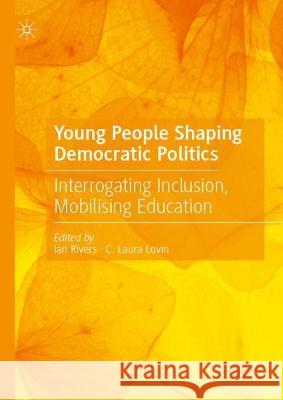Young People Shaping Democratic Politics: Interrogating Inclusion, Mobilising Education » książka
Young People Shaping Democratic Politics: Interrogating Inclusion, Mobilising Education
ISBN-13: 9783031293771 / Angielski
Young People Shaping Democratic Politics: Interrogating Inclusion, Mobilising Education
ISBN-13: 9783031293771 / Angielski
(netto: 536,72 VAT: 5%)
Najniższa cena z 30 dni: 501,19
ok. 16-18 dni roboczych.
Darmowa dostawa!
At a time when political mobilisation is a symptom of social dissatisfaction, young people’s participation in political decision-making, practice and ideological change, make foregrounding and investigating their political practices a necessity. The title of this book,Young People Shaping Democratic Politics: Interrogating Inclusion, Mobilising Educationclearly announces its intention, subject, and mission. This collection has been inspired by topical youth mobilisations that aim to address injustices and inequalities which are rooted in poverty, austerity, violence, increased surveillance, climate change, dislocation, xenophobia, the rise of authoritarian regimes, and a global turn to the political right. Whereas young people are politicised in moments of conflict and become symbolic conduits for the future of their nation, they represent a category most often relegated to the apolitical sphere before and after such moments of crisis. This edited collection seeks to expand our engagement with inclusion beyond educational institutions by situating young people at the centre of our inquiry, as agents of political processes that promote, problematise and re-imagine inclusive societies. The chapters engage in contemporary case-studies, which are mapped across a wide range of countries from Europe (Serbia, Spain and United Kingdom), North Africa (Egypt), South Africa, North America (United States), South-Asia (Bangladesh), and West Asia (Lebanon).
At a time when political mobilisation is a symptom of social dissatisfaction, young people’s participation in political decision-making, practice and ideological change, make foregrounding and investigating their political practices a necessity. The title of this book, Young People Shaping Democratic Politics: Interrogating Inclusion, Mobilising Education clearly announces its intention, subject, and mission. This collection has been inspired by topical youth mobilisations that aim to address injustices and inequalities which are rooted in poverty, austerity, violence, increased surveillance, climate change, dislocation, xenophobia, the rise of authoritarian regimes, and a global turn to the political right. Whereas young people are politicised in moments of conflict and become symbolic conduits for the future of their nation, they represent a category most often relegated to the apolitical sphere before and after such moments of crisis. This edited collection seeks to expand our engagement with inclusion beyond educational institutions by situating young people at the centre of our inquiry, as agents of political processes that promote, problematise and re-imagine inclusive societies. The chapters engage in contemporary case-studies, which are mapped across a wide range of countries from Europe (Serbia, Spain and United Kingdom), North Africa (Egypt), South Africa, North America (United States), South-Asia (Bangladesh), and West Asia (Lebanon).











